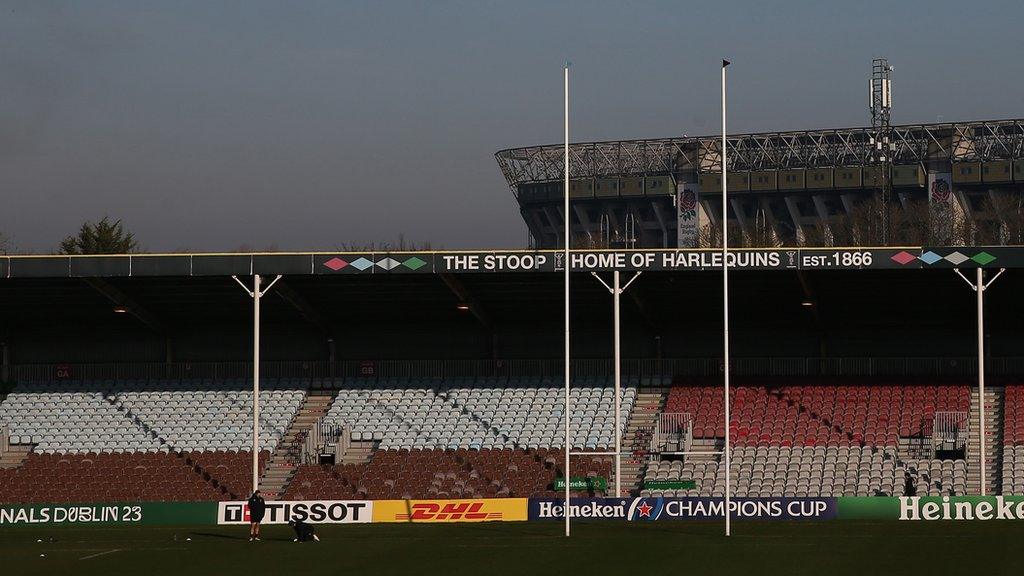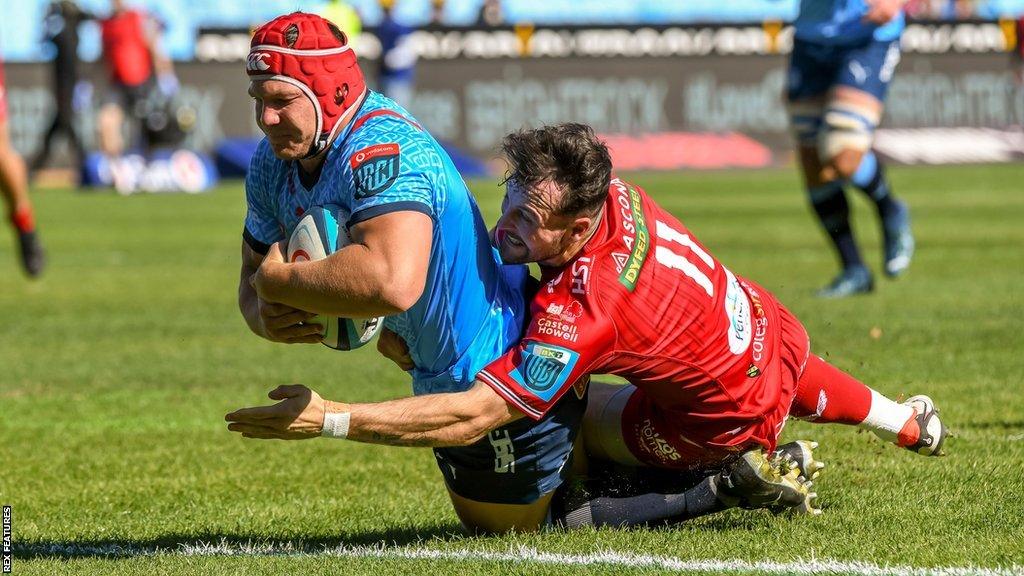Barbarians, Welsh derby and Ospreys in London - Just another Welsh rugby weekend
- Published

The Principality Stadium last hosted Wales v Barbarians in 2019
Even in the surreal world of Welsh rugby, the coming weekend will be strange.
On Friday night you have the Swansea-based Ospreys playing a 'home' United Rugby Championship (URC) game in south-west London against South African outfit Sharks.
Less than 24 hours later, Wales will play an uncapped match in Cardiff against invitational side the Barbarians.
The match will finish less than an hour before a Welsh league derby in Llanelli between Scarlets and Cardiff, while Wales' other professional side, Dragons, will be playing in Cork against URC defending champions Munster.
Are you following? After the positivity of a World Cup campaign which saw Warren Gatland's side top their pool in France before being knocked out in the quarter-finals by Argentina, welcome back to the wacky and often unfathomable world of Welsh rugby.
Wales v Barbarians 'unhelpful' and 'frustrating' - Scarlets boss Peel
Sentiment over substance?
The Welsh Rugby Union (WRU) decided to host a Wales fixture just a week after the World Cup final.
They are the only national governing body to sanction such a match this weekend, although World Cup winners the Springboks will embark on a four-day celebration tour around South Africa.
Critics of the game view it as a meaningless friendly which undermines the Welsh domestic game.
The WRU says a significant amount of turnover comes from gate receipts from international matches and that is essential for the financial future of Welsh rugby.
Wales would normally have four home games in November. That is not the case in 2023 because it is a World Cup year, although there were two pre-tournament warm-up matches, against England and South Africa, held in Cardiff in August.
This Saturday's game means an opportunity for Welsh fans to say goodbye to legends Alun Wyn Jones, Justin Tipuric and Leigh Halfpenny, who have all announced their international retirements in the last six months.
After announcing they were quitting international rugby in May which ruled them out of the World Cup, Jones and Tipuric will line up for the Barbarians, while Halfpenny will play one last time for Wales after being part of Gatland's squad in France.
The Barbarians will be coached by incoming New Zealand boss Scott Robertson and the controversial Eddie Jones, who has just stepped down as Australia head coach after a disastrous World Cup campaign where the Wallabies failed to reach the knockout stages.
The Barbarians party also includes former Australia captain Michael Hooper, who Jones omitted from his World Cup squad.
So the most intrigue and interest will be at the Principality Stadium on Saturday afternoon. The game will be watched by the biggest crowd, attract the most publicity and column inches and provide income for Welsh rugby.
But at what cost to the flagging domestic game in the country?
Derby date clash

Cardiff won 16-10 on their last visit to Parc y Scarlets in October 2022
Let's deal with the Welsh derby clash first. The four regions are providing the 23-man Wales squad this weekend because the match falls outside World Rugby's international window, with no players from French, English or Japanese clubs eligible.
Wales against the Barbarians will finish at around 16:30 GMT on Saturday afternoon, 45 minutes before Scarlets host Cardiff in a URC match, 50 miles away in Llanelli.
The Welsh derbies are the most lucrative and high-profile home fixtures in the season for the regions, who are only guaranteed 11 matches per year in front of their own fans.
For the Scarlets, this is the second biggest game of the season in Llanelli, behind the visit of Ospreys on 26 December. But in 2023-24, the match will be an afterthought for many.
How can the Scarlets market this occasion? Especially when they are missing their top stars, with Cardiff and Scarlets providing 10 players between them for Wales. Scarlets head coach Dwayne Peel described it "unhelpful" and "frustrating."
The WRU say this date has been in the calendar for a while and the Professional Rugby Board (PRB), which runs the professional game in Wales and is made up of representatives of the union and regions, knew it was happening.
Nonetheless, it is a fixture clash interim WRU chief executive Nigel Walker admitted was a mistake and said would not happen again.
Wales head coach Warren Gatland says he can understand the criticism and pointed to the fact he only picked 23 players rather than a larger original squad.
Co-operation appeared evident when Wales trained on Thursday against the Dragons who are without 15 players this week because of Wales involvement and injury.
The Dragons are missing 20 players as they travel to Cork to face Munster side who will have some Ireland internationals returning. It is hardly a level playing field.
Friday night London lights

Harlequins' home ground, The Stoop, is in the shadow of English rugby's headquarters Twickenham
Ospreys are playing Sharks in the URC on Friday night in a home game they have decided to switch to Harlequins' ground, Twickenham Stoop.
Their usual ground in Swansea is unavailable because of the Championship football match between Swansea City and Sunderland.
It is one of three matches Ospreys will have to move this season because as landlords, Swansea City's fixtures take precedence at the Swansea.com Stadium.
On this occasion, Ospreys have decided to branch out and try to attract a new audience in London, with many Welsh ex-pats and South Africans living in the English capital.
Only 3,017 attended Ospreys' opening home victory against Zebre in Swansea last weekend.
The London game is an ambitious idea that has been criticised by some and welcomed by others.
The Friday night fixture element has not helped because Ospreys' loyal fans might not be able to make a weekend of it. Also, the lack of star players will not help market the fixture.
The Sharks have none of their resting Springboks stars, while Ospreys are missing captain Tipuric, who has chosen to play for the Barbarians.
They were already without the likes of Jac Morgan, Dewi Lake, Adam Beard and George North, who are all involved with Wales.
So any innovation, whether you believe it is misguided or not, has not been helped by other elements of Welsh rugby.
Worrying signs

Scarlets have conceded 17 tries in their opening two United Rugby Championship matches in South Africa
There have already been concerning signs about what lies ahead for the Welsh regions this season.
All four sides lost on the opening weekend of the URC. The second round of fixtures brought another Scarlets hammering in South Africa, while Cardiff shaded a diabolical derby against Dragons and Ospreys sneaked a home win against a Zebre side who have lost their last 21 league games.
Financial constraints have hit the regions hard, with squad sizes reduced and the budgets decreased to £5.2m each.
That sum will go down further to £4.5m in 2024-25 and keeping out-of-contract top players in Wales will be challenging when you consider the much bigger budgets of the French and Japanese sides.
The question of whether Wales can keep facilitating four professional sides will continue to be high on the agenda during this campaign.
External funding has been sought, with the Dragons returning to private ownership and Cardiff in talks over a financial deal with a company from the Middle East.
These sides have struggled to train in pre-season because of lack of numbers and often had to arrange sessions against other teams as a result.
Dragons head coach Dai Flanagan has this week admitted that necessity has continued into the season.
Such adversity has been reflected in results on the field, and interest in the Welsh domestic game continues to wane with even the die-hards showing signs of giving up.
Only 8,500 people combined attended the two professional rugby matches in Wales last weekend. More muddled weekends like the one coming up are only likely to add to the apathy.
This in contrast to the thousands of Wales fans that made the trips to Bordeaux, Nice, Lyon, Nice and Marseille to watch their side in action during the World Cup.
For all the success Gatland had in managing to galvanise his team in France, the domestic problems remain and Alun Wyn Jones admitted this week he hopes the World Cup progress does not paper over the cracks of Welsh rugby.
Some joined-up thinking is required in the Welsh professional game. And quickly.